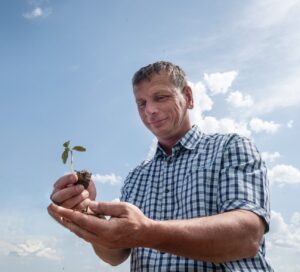Syngenta’s sustainability program reaches a new level in Dióskál
Starting this year, the INTERRA® Farm in Dióskáli will continue to operate not only as a farm showcasing Syngenta’s sustainability initiatives, but also as a prominent testing ground for its agronomic, plant protection and digital solutions. István Plótár’s farm in Zala provides other producers with more than a decade of experience worth following, with which they can enhance their competitiveness and sustainably increase their profitability.

Syngenta celebrates its 25th anniversary this November. During its quarter-century-long success story, it has served the needs of producers with continuous innovation, local conditions and personalized solutions. Decades of joint learning, experience-gaining and cooperation with producers in our country have resulted in farmers now receiving not only products, but also complex technological and professional solutions from Syngenta. Practical knowledge that is reflected in tangible results, income growth, cost reduction and more sustainable agricultural practices.
Around the world, including in Hungary, farmers are facing daunting challenges: the effects of climate change, rising consumer expectations, and a constantly changing regulatory environment, all while ensuring their profitability. For the past 25 years, Syngenta has been with farmers at every step of production, from seed selection to the introduction of precision technologies to the application of crop protection, biological and digital solutions. The common goal is still to enable farmers to produce on healthier soil, with less input and less environmental impact, while maintaining their profitability.
A good example of this is the Plótár farm in Dióskál, which joined the INTERRA® Farm network established as part of Syngenta’s sustainability efforts in 2013. The farm, located in the Kis-Balaton watershed, has gradually switched from traditional plowing to regenerative agricultural practices in recent years. First, the elimination of plowing improved soil quality, reduced fuel consumption and labor, and later, the use of cover crops further improved soil structure, organic matter content, water retention capacity, and plant nutrient uptake. Precision methods – such as variable seeding and optimal nutrient application – also brought cost savings and increased yields.










